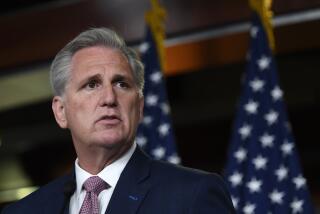Lott Sees Higher Medicare Premiums
- Share via
WASHINGTON — Senate Majority Leader Trent Lott (R-Miss.) said Monday that Medicare beneficiaries should expect to pay more to keep the huge health program on a sound financial basis.
The comments were the strongest yet from a top-ranking Republican on the coming debate over Medicare, and they suggest a possible replay of two years ago, when an intense partisan battle ended with nothing being done to solve Medicare’s looming financial failure.
Lott criticized the Clinton plan, announced last week, for not asking beneficiaries to bear a greater share of the costs. The administration’s plan does call for an increase in Medicare insurance premiums but relies heavily on savings in payments to hospitals, doctors and health maintenance organizations to postpone bankruptcy of Medicare’s hospital trust fund.
Beneficiaries “are going to have to bear more of the costs,” Lott told reporters after speaking to the American Hospital Assn. “You cannot continue to provide more and better services and say, ‘Oh, and, by the way, you don’t have to pay for it,’ ” Lott said.
When the Clinton plan was released last week, Republicans carefully avoided criticism, noting gently only that it called for greater cuts in spending growth than the White House proposed last year.
The current administration plan would save $138 billion over six years, while its 1996 plan called for $124 billion in savings. That compares to savings of $158 billion sought by the GOP last year.
Lott was not ready to offer alternate numbers Monday, and he carefully avoided making any specific proposal to boost premiums. But he made it clear that he thinks the administration is avoiding a realistic approach to a severe financial problem.
Lott said that the government should make long-term reforms in Medicare to prepare it for the time when large numbers of the baby-boom generation become eligible. The oldest will reach that threshold in the year 2011.
The administration instead is seeking a short-range answer. Its proposal would extend the trust fund, which is projected to run out of money in 2001, by six years, to 2007.
A final Medicare plan “must have some control, some restraint, on both the provider side and the beneficiary side,” Lott said.
He indicated that the administration wants to take too much from hospitals, doctors and HMOs. It is “unfair and ineffective” for the biggest savings to come from reductions in the rate of payments to HMOs, which do the best job of controlling health care costs, Lott said.
Of the $138 billion in savings under the Clinton plan, $18 billion would come in the form of higher premiums. Specifically, the monthly premium beneficiaries pay for their “Part B” Medicare insurance would rise in 2002 from the $51.50 a month called for in current law to $61.90 monthly.
The topic of higher premiums is politically thorny, especially for the GOP. The 1996 Republican proposal so roundly criticized by Democrats last year called for an increase in premiums very similar to the one Clinton is now proposing. But the Democrats maneuvered the issue to their advantage and the proposal dogged the GOP throughout the 1996 elections.
Clinton has indicated that he might accept the idea of graduated monthly premiums based on wealth, with higher-income beneficiaries paying higher amounts. Lott agreed that such an idea could be “an overall part of the solution” to Medicare’s financial problems. But congressional Republicans are “not going to do it alone,” he insisted.
Health and Human Services Secretary Donna Shalala, in her remarks to the same hospital group, said that Clinton wants to reach agreement with the Republican Congress on a way to control Medicare’s runaway spending.
“The president has made it clear that he wants 1997 to be the year this gridlock ends--and a bipartisan agreement on Medicare begins . . . “ Shalala said.
“There is new urgency” to the task, she said, noting that rising Medicare costs drove public health spending up 8.7% in 1995, compared with 2.9% in the private sector, according to a report issued Monday by her department.
Total health spending for 1995--the latest year available--climbed 5.5%, reaching $988.5 billion, the report said. Combined with an increase of 5.1% for 1994, the increase was the slowest for a two-year period in more than 30 years--evidence that managed care apparently has ended a long trend of fast-rising prices, at least in the private sector.
Public programs like Medicare, which serves people 65 and older as well as the disabled of all ages, and Medicaid, which serves the poor, “must become more prudent purchasers of health care services,” Shalala said.
More to Read
Get the L.A. Times Politics newsletter
Deeply reported insights into legislation, politics and policy from Sacramento, Washington and beyond. In your inbox three times per week.
You may occasionally receive promotional content from the Los Angeles Times.










